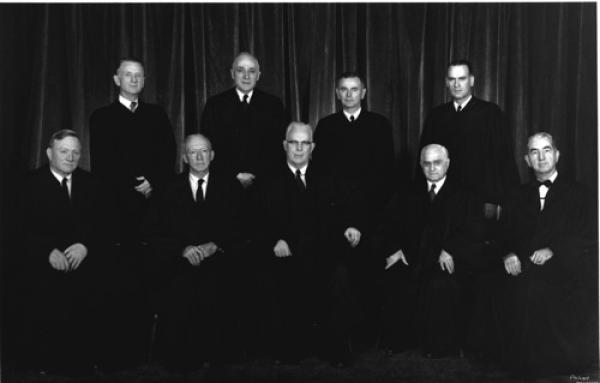“You have the right to remain silent, anything you say can and will be used against you in a court of law….” This phrase is heard in many different places in modern culture. Movies, songs, and TV shows use this phrase in police-themed entertainment. However, these Miranda Rights were not always as important as they are today.
Miranda rights were established after Miranda v. Arizona went before the Supreme Court on February 28, 1966. The justices ruled 5-4 in favor of establishing Miranda Rights.1 The Miranda decision established that 5th-amendment protections against self-incrimination extend outside of formal court proceedings. It created devices to protect a suspect from the coercive nature of police interrogation rooms, and it gave the framework of the Miranda Rights used today. The court did not specify how the rights had to be administered, or as it has come to be called, “Mirandizing.”2 These rights seemed appropriate to the Supreme Court justices at the time they were established.
However, the world changes, and questions haven risen about whether they still uphold constitutional protections adequately. That the Miranda Rights have been tried and tested through many cases proves that they have been efficient in upholding constitutional rights. This is also evident because when the Supreme Court had the chance to remove Miranda Rights, they elected not to, instead reaffirming these rights.3

Since they were established in 1966, Miranda Rights have not dramatically changed. The rights are supposed to provide protective assurances to a suspect in custody charged with a crime. Before Miranda Rights, these protections were in the constitution but were not very specific. For example, the Bill of Rights contains the 5th Amendment which states “No person shall be compelled in any criminal to be a witness against himself,” which gives the right to self-incrimination. However, before Miranda Rights, this right was interpreted by the courts to protect from self-incrimination in the courtroom only. Miranda changed that by extending that right to every situation in which someone may be compelled to incriminate themselves.4
The Miranda Decision also guarantees, “An individual swept from familiar surroundings into police custody, surrounded by antagonistic forces, and subjected to the techniques of persuasion described in the [standard police interrogation manuals] cannot be otherwise than under compulsion to speak.” This means that someone under police custody is immediately put in a state of intimidation, which nullifies any statement acquired during this time. The whole intimidation process contradicted the 5th Amendment Privilege. So, being put in a coercive environment, leading to the production of self-incriminating testimony, was now deemed illegal.5
To prevent this feeling of intimidation and the nullifying of any statement said in a custodial environment, the court established Miranda Rights. These familiar four-part rights include, “the right to remain silent, anything you say in court can and will be used against you in court. You have the right to an attorney, if you cannot afford one, one will be appointed to you.” However, the Court did not require an exact method of how to inform a suspect their Miranda Rights. Every police station can distribute these rights how they please. The two most common methods are having the rights read to the suspect or giving them a written statement, which requires them to check off and sign that they understand their rights. After being given their rights, the suspects have the opportunity to waive their rights and communicate with the police, and they also have the right to stop talking to the police at any time. The suspect’s acknowledgement of their rights not only protects the suspect, but also the police officers, by removing liability.6

In the processing of a criminal, the Miranda Rights in combination with processing paperwork have created the new norm for police officers. For example, in regular standard procedure a police officer may make an arrest and take the suspect into custody. He then must read the suspect his or her Miranda Rights at any time between the arrest and any attempt at an interrogation. Most police officers will state their rights as soon as possible so they can begin questioning. The officer then can ask the suspect to waive their right to have an attorney present during questioning and take down any statement he or she wants to give. However, this waiver must be made intelligently and with full knowledge, and as stated in the majority opinion by Chief Justice Warren, “The accused who does not know his rights and therefore does not make a request may be the person who most needs counsel.”7 This procedure is how the court intended Miranda Rights to be used during this case fifty-two years ago. There have been few changes to them since.8
Since 1966, the Supreme Court has heard a few cases regarding Miranda Rights. However, when they heard the case of Dickerson v. United States in 2000, the Court had another colossal decision to make. The Court heard the case because of the 3501 Statute that Congress established, which gave prosecutors the ability to overrule Miranda Rights. This statute was never invoked by prosecutors to win a case in the 33 years it was available, because they knew of its power to undermine Miranda. The Supreme Court took this case because the saw the imbalance between the Miranda Rights and the 3501 Statute. They ruled in favor of Miranda and declared the 3501 Statute unconstitutional. They also stated that Congress cannot pass statutes that undermine the Court’s power to rule on Constitutional Rights.9
These examples show how vital Miranda rights have been to the Criminal Justice System. However, as with every decision made, there are always some complaints. One of the contingencies of Miranda states that confessions cannot be achieved with methods of coercion. Opposers of Miranda Rights believe that the thought process behind what is considered “coercion,” is discretionary.10 Every judge may look at what is considered “coercion” differently. For example, in the case of John W. Hinckley Jr., who was arrested for the attempted murder of President Ronald Reagan, he was taken to a local police station in Washington D.C. for questioning where he was read his Miranda Rights three times in a two-hour period. He proceeded to sign the waiver of rights form after he checked “yes” to understanding his rights. He then said he wanted to talk to the police but wanted to talk to his father’s lawyer in Dallas first. He was then taken to the FBI station where he was read his rights a fourth time where he waived his rights, except talking to the police before consulting a lawyer. He then went on to willfully answer some “background” questions asked by the FBI agents. This “background” information was suppressed by the D.C. District Court, and the appellate court also suppressed this “background” information saying it was in violation of Miranda. In this case, the police officers had no bad intentions of seeking a confession, but it can be understood as to how there are some opposers to Miranda, saying it protects the suspects too much.11

After seeing how Miranda’s procedures have lasted throughout the years, as well as they were kept, and reaffirmed. These rights not only protect suspects, but they also keep society’s best interests in mind as stated in Moran v. Burbine. This case stated and put in place safeguards to Miranda Rights that prevented a level of overreaching. There is so much the Supreme Court can do to protect against the misuse of a procedure. In the end, Miranda Rights should continue as a fundamental procedure in the American justice system for a very long time. They have been intertwined with police procedure for 52 years now, and if put on trial, the right to remain silent is a constitutional right that cannot be undermined.
- Encyclopedia Britannica, July 1998, s.v. “Miranda v. Arizona.” ↵
- Wikipedia, 2018, s.v. “Miranda v. Arizona. ↵
- Sheldon H. Elsen; Arthur Rosett, “Protections for the Suspect under Miranda v. Arizona,” Columbia Law Review 67, no. 4 (April 1967): 649. ↵
- Yale Kasmir, “Miranda v. United States,” In The Oxford Guide to United States Supreme Court Decisions, 2d ed., edited by K. L. Hall and J.W.Ely Jr., (Oxford: Oxford Univ. Press, 2009), 225. ↵
- Yale Kasmir, “Miranda v. United States,” In The Oxford Guide to United States Supreme Court Decisions, 2d ed., edited by K. L. Hall and J.W.Ely Jr., (Oxford: Oxford Univ. Press, 2009), 226. ↵
- Yale Kasmir, “Miranda v. United States,” In The Oxford Guide to United States Supreme Court Decisions, 2d ed., edited by K. L. Hall and J.W.Ely Jr. (Oxford: Oxford Univ. Press, 2009), 227. ↵
- Randy Wagner, Miranda V. Arizona, 1966, (Salem Press, Inc., 2008), 1820. ↵
- Ashley G. Blackburn, Miranda v. Arizona (Thousand Oaks, CA: Sage Publications, Inc., 2009), 526. ↵
- Erwin Chemerinsky, “The Court Should Have Remained Silent: Why the Court Erred in Deciding Dickerson v. United States,” University of Pennsylvania Law Review 149, no. 1 (2000), 287-288. ↵
- George C. Thomas, and Richard A. Leo, “The Effects of Miranda v. Arizona: “Embedded” in Our National Culture?” Crime and Justice 29(2002): 205. ↵
- Fred E. Inbau, “Over-Reaction: The Mischief of Miranda v. Arizona,” The Journal of Criminal Law and Criminology, 89, no. 4 (1999): 1449-1452. ↵



22 comments
Oscar Ortega
Fantastic article. The justice system is one of the foundations of America be it as a nation or as a society and its importance in recognizing the need of innocent until proven guilty and justness to everyone, even those who may have broken laws, is a vital part of what makes America America. The idea that anyone could imagine that Miranda Rights aren’t essential to the procedures and the fair treatment of any and every citizen, or even simply every person, who may find themselves near the wrong side of the law in America is insane. Great job
Lesley Martinez
I hear that phrase at least once a week and to think that it was not as important before as it is today is outrageous. This is the first time I’ve heard that the Supreme Court had to opportunity to remove the Miranda Rights. These rights are extremely important as Chief Justice Warren said, “The accused…may be the person who most needs counsel.” Miranda Rights are vital to the American criminal justice system and this article is a well-written form to demonstrate the benefits and consequences it has introduced.
Nicholas Robitille
The Miranda Rights are an integral part to the legal system, protecting the rights of the accused to an attorney and to not self-incriminate. I believe it truly upholds the spirit of the constitution for the Miranda Rights to have survived both an attempted undermining and an attempted overruling to go on to continue protecting the rights of the accused. The Miranda rights allow the courts to interpret the fifth amendment to the best of their ability.
Nelly Perez
I’ve always heard the “you have the right to remain silent” line from watching Law and Order and NCIS whenever they caught someone. The same goes for reading books with a mystery involved. I did not know how it all started at first until I read this article. It explained more about Miranda Rights and how important they were to our society today.
Amanda Uribe
I think the Miranda Rights is one of the best forms of justice we have today. Some people really do not know their rights as an American citizen. It allows all around fairness to everyone who is being arrested to know what the best option is for them. Whether that be remaining silent or asking for a lawyer. I think the supreme court did right by Miranda.
James Disrud
The Miranda Rights is something that is and has been super beneficial, not everybody knows they’re constitutional rights. This is important because some people don’t know you have the right to an attorney, or that you don’t have to talk to the police officer till your lawyer comes, the simple process of reading someone they’re rights is super important. The importance of the Miranda rights will be used for generations to come. I really enjoyed the article, and I learned more about the Miranda rights and why there so beneficial
Lilia Seijas
The Miranda Rights, have and will continue to be an important part of our judicial system. The whole idea of Miranda Rights helped to serve those who do not have a good or complete understanding of their rights when being arrested. This is extremely important in cases dealing with young teenagers, mainly because in modern education, we are not taught about our rights as children. Many Americans are not aware of how important and crucial some of the amendments of the constitution are, which is why the Miranda Rights are necessary to reinforce those rights.
Thalia Romo
I really enjoy learning about the constitution and how some cases arise from being deemed unconstitutional, leading to precedence being set. Bruno Montes De Oca does a good job at laying out how Miranda Rights were established. I didn’t know, until reading this article that before Miranda Rights were established, self-incrimination was only protected in a court room setting. If that were the same for today’s time, things would still be very harsh and many individuals wouldn’t be able to save themselves. I wasn’t aware of the other court cases mentioned in this article, such as Moran v. Burbine, but it [the article] shows the importance that Miranda v. Arizona has played in the Criminal Justice system.
Diego Terrazas
Miranda Rights I believe was a huge step forward for the judicial system. It gave the right to remain silent due to the fact that anything said can be used against you. This is important especially for the innocent. I believe it is crucial for citizens to know their rights, especially their Miranda Rights. It cannot always be assured the authority would follow constitutional rights so it is important to be aware of such things.
Octaviano Huron
The Miranda Rights are, as a whole, a very essential portion of the modern judicial system. They protect suspects of crimes for good reason: they protect the innocent from being wrongly accused. The Miranda Rights have remained intact for over fifty years as a testament to assume people to be innocent until proven guilty. Thank you for a very engaging and thought-provoking article.